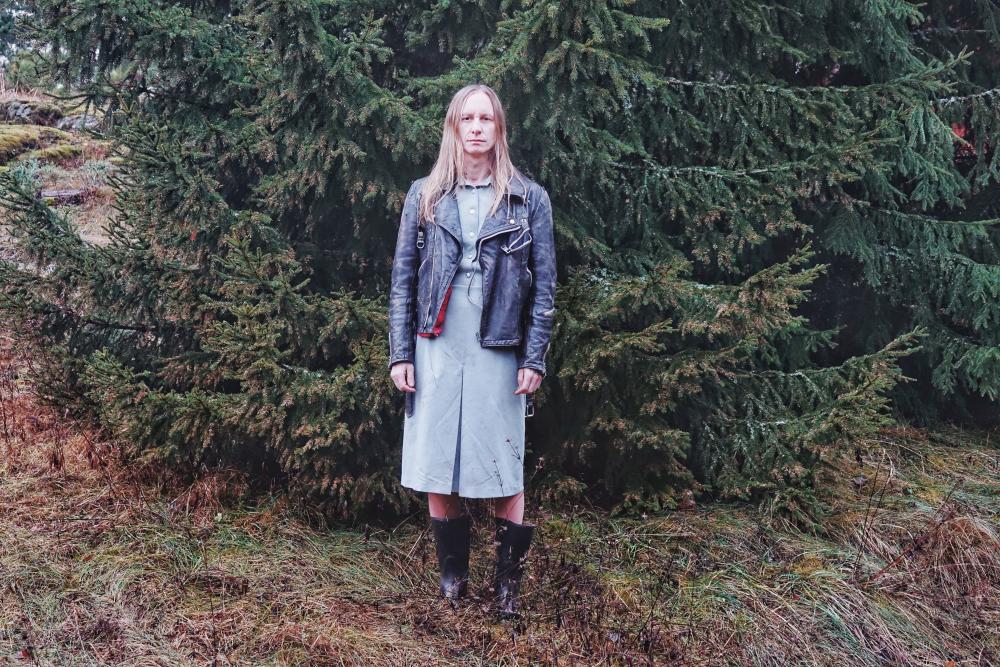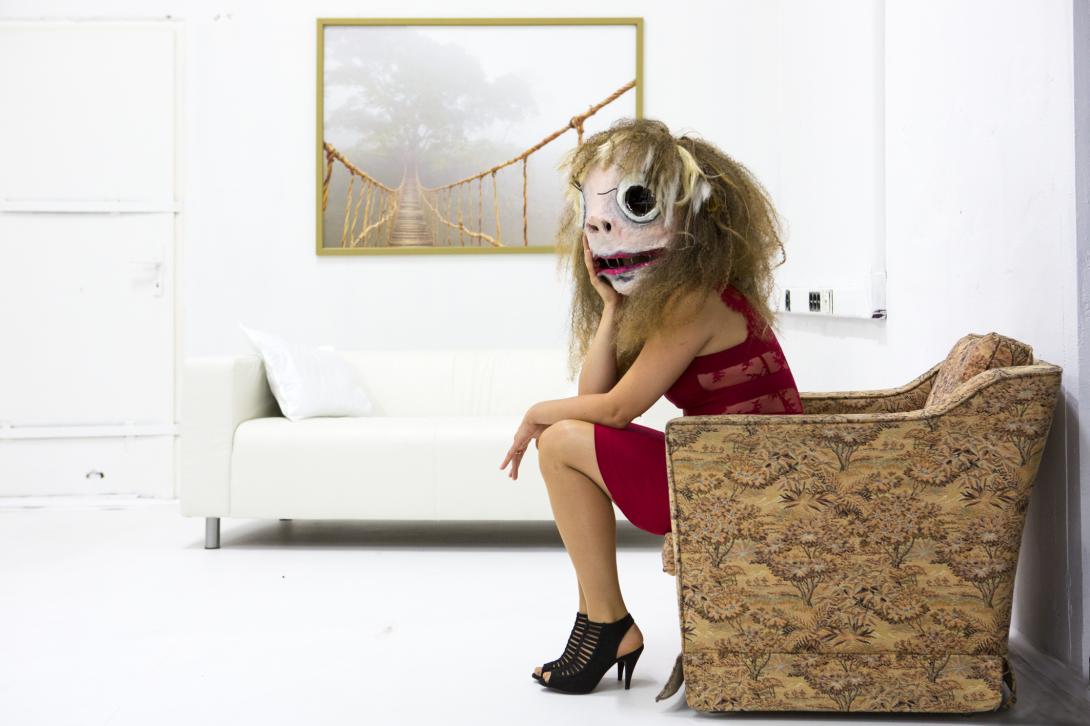Too close for comfort
an interview with Markus Öhrn
An interview with Markus Öhrn by Erika Sprey and Tessel Holsbergen (Kaaitheater), with help from Suzanne Cleerdin.
Markus Öhrn is a Swedish visual artist whose work comprises video, sound installation and performance. For this conversation, that took place just before Christmas, we find him in his farm in an icy cold Sweden. Patriarchal violence, in its many disturbing guises, has been a recurring theme in the work of Markus. In this performance, Domestic Violence, he confronts us with a ‘typical’ cycle of violence (building tension, escalation, reconciliation) within a white, heterosexual couple. By putting us in a voyeurist position, Öhrn reminds us once more that there is a seed of evil residing in all of us that we need to address: ‘These patterns are so engraved that we can not solve it in one generation.’
What was the initial spark for the creation of this performance?
First and foremost, I have experienced domestic violence within my own family. Someone close to me has been violently beaten by her husband, granting me an intimate, closer look at how this kind of violence is structured. As a family member I would often wonder: “why don't you leave this motherfucking asshole?”. After she had been beaten multiple times, I noticed that I started to blame her. This is a big issue, blaming the situation on her. However, this piece is about violence in a multitude of situations that could be recognizable for many people. Power games are prevalent in most relationships, to a certain amount and degree. Love is violent and romantic love has a violent history. It rests on the notion that when you are in love with someone you want to ‘own’ that person completely. This is the ideology of romantic love, the idea that you get when you are brought up in a patriarchal family. In that sense, the subject is not alien to me.
You have done research and based your performance on several court cases. How did your research process evolve over time?
Indeed, I looked at a lot of court cases, and together with the experience of one of my family members, I started to realize that, deep down, pretty much the same pattern repeats itself in each case. I think it is important for people to understand this when they see my work. It is provocative, in one way or the other, but it has been thoroughly thought through. I'm not just throwing shit at you, just like that. I used the court cases that were very close to the imagination or experiences of many people.
It became very important for me to make a piece where the violence is not the core. In Domestic Violence, it is the buildup to the violence that is most important to me. Speaking to victims of domestic violence, you hear that the violence in itself can feel like a relief after such a build up of tension. Once the violence has happened, it is no longer a threat to be beaten. This psychological terror is, most of the time, the worst part of the problem. When the beating happens, you know that soon it will be over. And afterwards the perpetrator becomes a victim, because he lost control. Which gives you control for a second. Lastly, the actors, Janet Rothe and Jakob Öhrman, put their own experience with the subject into the play as well, as they are both experts in these kinds of relationships, as we all are.
Speaking about the buildup of violence, verbal language is often part of this buildup, for example through verbal insults and manipulations. Could you elaborate a bit further on your motivations to leave out this particular dimension?
I knew that I wanted to work with domestic violence, and I was thinking about how I could choreograph this issue without the use of language, for it to be recognizable for most people within a European context. It is not very often that you make a piece that has the kind of impact that I think this piece has on the audience. This is because there is no language which means you are left to guess at the gestures and the bodies. There is no need to tell someone that ‘she is a fucking whore’, as violence is hidden in very small things.
This lack of language also serves as a way for the audience to project and relate their own situations and stories to the situation on the stage. By not telling the whole story and by leaving gaps for the people to fill in, you engage the audience. Everybody that sees it will have their own experience, and I really like that. You create a possibility for the audience to project their own fantasies and their own being onto the situation, rather than telling them exactly how it is. That is the way I work best.
When I saw the performance I thought to myself “should I stay, should I go, should I look, should I look away?”. I felt really trapped, to be honest. You feel like a coward when you look away, but if you look you become a voyeur. Could you elaborate on that? Why do people enjoy watching extreme violence?
In my long durational works, I like to put the audience in a voyeurist position. But of course, it is also impossible to know what is going to happen, before you meet the audience. I was quite shocked in a good and bad way when it premiered. I thought that people would leave. Obviously, I am not making pieces for people to leave, but I thought that maybe some would, but instead, they were really waiting for the performer to be hit very badly. People also told me once they’ve spent perhaps an hour watching her being hit, they start feeling guilty: “Should I leave her now?”. This was also a way of engaging the audience, although it was not a very conscious decision.
But actually it is the same in normal life: you hear your neighbors screaming, you witness violent situations… It is something that most of us are unconsciously drawn to. Some kinds of violence are totally impossible to watch, but some kinds of violence are “enjoyable” in inverted commas. I think because it's close to us, because it is unheimlich. I think you can't stop watching it because there is something that we know or recognise. It is the uncanny feeling of knowing the situation, and that is maybe why people stay.
Close to you in the same sense that it's close to you because of your family?
No, not that you need to have experienced it in your own family, but rather that it is part of the dynamic of violence in stereotypical heteronormative relationships. I know that there is violence in non-heteronormative relationships too, but I focused on hetero-relationships since the percentage is very different. However, I think that everybody will recognise parts of it. Everyone knows someone that has been badly treated by their partner. Maybe not badly beaten, it might not have been bloody, but there was this psychological terror going on. In a way, it is in the DNA of our western society.
Would you say that the dynamics we see in domestic violence are, perhaps in a very caricatural form, present in perhaps all patriarchal relations, albeit in a more diluted form?
Yes, I would go so far as to say that. I think we all know this kind of violence, I would say that everyone plays a part in it. What I am doing is that I stage it. We fake everything: there is a big mask, we understand that the person behind the mask is wearing a helmet, so when the man is hitting her, we use the masks to make looking at violence possible.
Your new piece seems like a way to reenact trauma. It made me think of Mike Kelley and how he uses fetish and repetition to reenact trauma. Is trauma for you a concept that you can relate to?
Yes, of course, Mike Kelley is one of my inspirations. It is perhaps somewhat old-fashioned to say this nowadays, but I think my whole artistic practice is about solving some kind of patriarchal trauma. I was brought up in a very patriarchal family, I know what the patriarch is, I also have these tendencies within myself. My practice is not about coming up with a solution, because the solution to me is very often quite banal: we should not be violent to each other, we should be equal, we should not treat each other differently… But for me to be the symptom of evil, to present that symptom over and over again, is my way of saying that even when you think that you are so equal, so liberal, you are not. These patterns are so engraved in our society that we cannot say in the course of one generation that we’ve got rid of it. We all know that our way of life as it is today is not equal. I think it is important for us to not live in the fantasy that we are doing good. For me, theater and art are not about doing good: it is about reminding ourselves about the predators we are in any kind of relationship.
The aim of your activism seems to be to remind us that the seed of evil is in us all. But there are also voices saying “why should I go see a piece that is a reproduction of violence that I already know too well?” Why should people witness this again, and who would you really like to see this piece?
I was quite worried about that, because first of all, a piece like this doesn't happen until it meets its audience. You cannot do a test round and be like “what do you like?”. You have to deal with the consequences. But I think everyone should see it. Victims of domestic violence from a women’s shelter that have seen it felt that it was so realistic that everyone should see this. But one of the things that makes me a bit disturbed is when people refuse to see it because they think they know what they are going to see. Because you haven't. But if you come and see it, and you say “this is very disturbing for me because it is a reproduction of violence”, fine. The question is: should we depict violence on stage? I am interested in that translation, to the stage and to the live moment of domestic violence. Should theater only be uplifting and educational?
What could be a possible takeaway for any person who has witnessed your performance?
That's a very hard question. But I have one example that comes to my mind. It's when we played it for the last time in 2019, in Stockholm. There was a woman that was about to leave because she saw the actress had been beaten again. She was really upset and was getting her coat but then she came back in again, even more upset, having told her friend. “No, I cannot leave her in there. I’ll go back.” This feeling of guilt: for being there but also wanting to stay. She actually wrote to me a few days later that she was very disturbed but at the same time something happened with her: a doubtful realization that not only the performance, but that she too was ‘dirty’. If the audience feels ‘dirty’ and starts to think about what they have seen and the reasons they stayed, then I would be quite happy.

